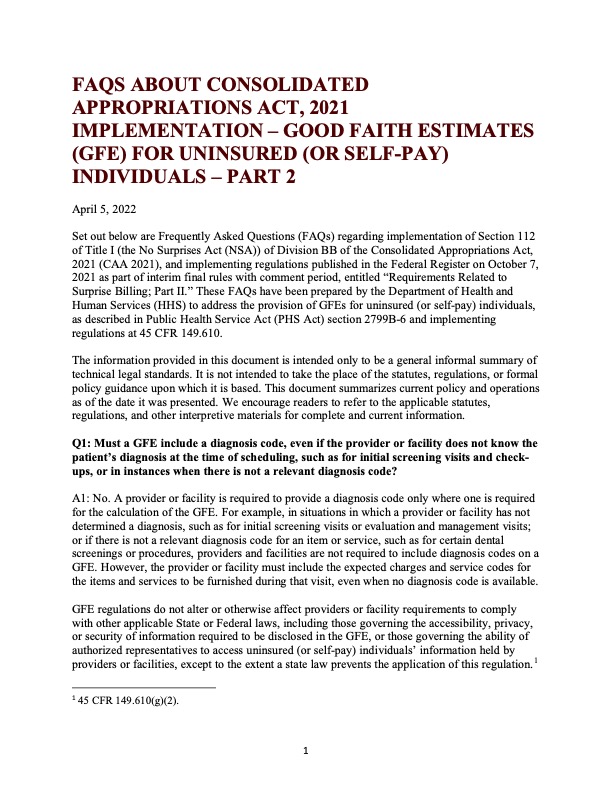April 5, 2022
Set out below are Frequently Asked Questions (FAQs) regarding implementation of Section 112 of Title I (the No Surprises Act (NSA)) of Division BB of the Consolidated Appropriations Act, 2021 (CAA 2021), and implementing regulations published in the Federal Register on October 7, 2021 as part of interim final rules with comment period, entitled “Requirements Related to Surprise Billing; Part II.” These FAQs have been prepared by the Department of Health and Human Services (HHS) to address the provision of GFEs for uninsured (or self-pay) individuals, as described in Public Health Service Act (PHS Act) section 2799B-6 and implementing regulations at 45 CFR 149.610.
The information provided in this document is intended only to be a general informal summary of technical legal standards. It is not intended to take the place of the statutes, regulations, or formal policy guidance upon which it is based. This document summarizes current policy and operations as of the date it was presented. We encourage readers to refer to the applicable statutes, regulations, and other interpretive materials for complete and current information.
Q1: Must a GFE include a diagnosis code, even if the provider or facility does not know the patient’s diagnosis at the time of scheduling, such as for initial screening visits and check- ups, or in instances when there is not a relevant diagnosis code?
A1: No. A provider or facility is required to provide a diagnosis code only where one is required for the calculation of the GFE. For example, in situations in which a provider or facility has not determined a diagnosis, such as for initial screening visits or evaluation and management visits; or if there is not a relevant diagnosis code for an item or service, such as for certain dental screenings or procedures, providers and facilities are not required to include diagnosis codes on a GFE. However, the provider or facility must include the expected charges and service codes for the items and services to be furnished during that visit, even when no diagnosis code is available.
GFE regulations do not alter or otherwise affect providers or facility requirements to comply with other applicable State or Federal laws, including those governing the accessibility, privacy, or security of information required to be disclosed in the GFE, or those governing the ability of authorized representatives to access uninsured (or self-pay) individuals’ information held by 1 providers or facilities, except to the extent a state law prevents the application of this regulation.
1 45 CFR 149.610(g)(2).
1
Providers and facilities are reminded that a GFE provided to an uninsured (or self-pay) individual is considered part of the patient’s medical record and must be maintained in the same manner as a patient’s medical record.2
Additional information regarding health information privacy, can be found at the following resources:
- The HIPAA Privacy Rule: https://www.hhs.gov/hipaa/for- professionals/privacy/index.html;
- Information Related to Mental and Behavioral Health, including Opioid Overdose:https://www.hhs.gov/hipaa/for-professionals/special-topics/mental-health/index.html.Providers and facilities may also wish to review their respective State laws and regulations for additional guidance regarding state-specific privacy requirements.Q2: Are providers and facilities required to provide expected charges for future visits in the same GFE provided for an initial visit?
A2: No. Providers and facilities are not required to include in a GFE for an initial visit any expected charges for items or services that will be furnished in the future after the initial visit and that are not items or services reasonably expected to be furnished in conjunction with the primary item or service, for that period of care.
Following an initial visit with an uninsured (or self-pay) individual, upon request or upon scheduling of additional items or services, a provider or facility must provide a new GFE that includes expected charges for the items and services expected to be furnished, consistent with regulations at 45 CFR 149.610. However, a provider or facility may, but is not required to, instead issue a single GFE for recurring primary items or services, consistent with 45 CFR 149.610(b)(1)(x).
Q3: For recurring items and services, does a GFE need to be provided for each instance of a recurring item or service?
A3: No. In circumstances where a provider or facility expects to furnish recurring items and services, such as periodic counseling services or physical therapy services, a provider or facility may issue a single GFE for those recurring items or services, rather than a GFE for each instance. A GFE issued to an uninsured (or self-pay) individual for recurring items and services must include in a clear and understandable manner the expected scope of the recurring items or services (such as timeframes, frequency, and total number of recurring items or services). The scope of such a GFE must not exceed 12 months. If additional recurrences of such recurring items or services are expected beyond 12 months, a convening provider or facility must provide an uninsured (or self-pay) individual a new GFE.
The convening provider or facility is also required to provide an uninsured (or self-pay) individual with a new GFE if the convening provider/facility expects or is notified of any
2 45 CFR 149.610(f)(1); 86 FR 56022.
2
changes to the scope of a GFE (such as expected changes to the expected charges, items, services, frequency, recurrences, duration, providers, or facilities), including any changes related to GFE information from co-providers or co-facilities.
A new GFE must be issued to the uninsured (or self-pay) individual no later than 1 business day before the items or services are scheduled to be furnished. Providers and facilities must also communicate these changes to the individual upon delivery of the new GFE to help the individual understand what has changed between the initial GFE and the new GFE.
Q4: How do providers and facilities address situations where unforeseen items or services that were not otherwise scheduled in advance are furnished during a visit?
A4: The interim final rules do not require the GFE to include charges for items or services that could not have been reasonably expected. A GFE provided to uninsured (or self-pay) individuals must include an itemized list of items or services that are reasonably expected to be furnished, grouped by each provider or facility, for that period of care.
If a provider or facility does furnish an item or service that was not included in the original GFE, and the difference between the billed charges and the GFE from the provider or facility is $400 or more, the uninsured or (self-pay) individual may initiate the patient-provider dispute resolution (PPDR) process. In such an instance, the provider or facility will have an opportunity to present evidence to an independent third party (a selected dispute resolution entity) to demonstrate why the additional chargers were for items or services that were medically necessary and that could not have reasonably been expected by the provider or facility when the GFE was provided. More information about the PPDR process can be found here: https://www.cms.gov/nosurprises/providers-payment-resolution-with-patients.
If a provider or facility expects or is notified of any changes to the scope of a GFE that was provided at the time of scheduling (such as expected changes to the expected charges, items, services, frequency, recurrences, duration, providers, or facilities), the provider or facility must provide a new GFE to the uninsured (or self-pay) individual no later than 1 business day before the items or services are scheduled to be furnished. Providers and facilities are encouraged to review any changes to a GFE with patients, to help them understand what has changed between the initial GFE and the new GFE.
Q5: Is a provider or facility required to provide a GFE to uninsured (or self-pay) individuals upon scheduling same-day (or walk-in) items or services?
A5: No. The requirement to provide a GFE to an uninsured (or self-pay) individual under 45 CFR 149.610 is not triggered upon scheduling an item or service if the item or service is being scheduled fewer than 3 business days before the date the item or service is expected to be furnished.
For example, if an uninsured (or self-pay) individual arrives to schedule same-day laboratory testing services, the laboratory testing provider or facility is not required to provide the individual with a GFE.
3
Q6: Suppose a provider or facility did not provide an individual with a GFE at the time the individual scheduled an item or service because she was not uninsured (or self-pay) at that time, but when she arrives for the scheduled item or service to be furnished, her insurance status has changed such that she is now uninsured (or self-pay). Must the provider or facility provide a GFE to the individual prior to providing the item or service, even if it means rescheduling the item or service for a later date?
A6: No. When an individual schedules an appointment with a provider or facility, or upon request, the provider or facility must inquire if the individual is uninsured (or self-pay). If the individual is uninsured (or-self pay) at that time, the provider or facility must provide a GFE to the individual consistent with the requirements in 45 CFR 149.610. In situations where a provider or facility who has previously determined that an individual was not uninsured (or self- pay) becomes aware that an individual is uninsured (or self-pay) fewer than 3 business days in advance of the scheduled furnishing of items or services, nothing in the GFE regulations at 45 CFR 149.610 require that the provider or facility provide a GFE to such an individual, or reschedule an appointment to allow for the provision of a GFE to such an individual.
For individuals who, at the time of scheduling or request, are not uninsured (or self-pay), HHS has indicated in guidance that it will defer enforcement of the requirement under PHS Act section 2799B–6, as added by section 112 of division BB of the CAA, that providers and facilities provide a GFE to such individual’s plan or coverage, until rulemaking to implement this requirement is adopted and applicable.3 This means that until further rulemaking to implement this requirement is adopted and applicable, HHS will not enforce against providers and facilities that do not provide GFEs to plans and issuers for individuals who are not uninsured (or self-pay), as defined in 45 CFR 149.610(a)(2)(xiii), at the time the individual schedules or requests the GFE for the items or services expected to be furnished.
We encourage providers and facilities to inform patients when scheduling items or services or responding to a request for a GFE that they should contact their provider if any information related to their appointment, including their insurance status, changes in advance of the appointment, so that a new GFE can be provided, if necessary.
The contents of this document do not have the force and effect of law and are not meant to bind the public in any way, unless specifically incorporated into a contract. This document is intended only to provide clarity to the public regarding existing requirements under the law.
This communication was printed, published, or produced and disseminated at U.S. taxpayer expense.
3 FAQs About Affordable Care Act and Consolidated Appropriations Act, 2021 Implementation Part 49 (August 20, 2021), available at: https://www.cms.gov/CCIIO/Resources/Fact-Sheets-and- FAQs/Downloads/FAQs-Part-49.pdf.
4




